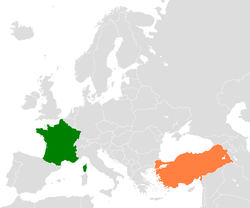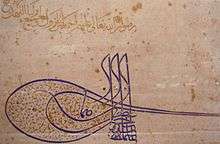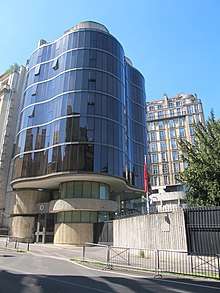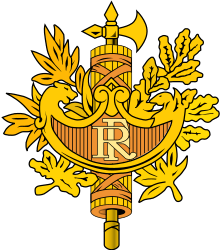France–Turkey relations
French–Turkish relations cover a long period from the 16th century to the present, starting with the alliance established between Francis I and Suleiman the Magnificent. Relations remained essentially friendly during a period of nearly three centuries, with the resumption of intense contacts from the reign of Louis XIV. Relations became more complex with the invasion of the Ottoman territory of Egypt by Napoleon I in 1798, and the dawn of the modern era.
 | |
France |
Turkey |
|---|---|
| Diplomatic mission | |
| Embassy of France, Ankara | Embassy of Turkey, Paris |
Country comparison
| Population | 67,063,703 | 79,814,871 |
| Area | 640,679 km2 (247,368 sq mi) | 783,356 km2 (302,455 sq mi) |
| Population Density | 116/km² (270/sq mi) | 102/km2 (264.2/sq mi) |
| Capital | Paris | Ankara |
| Largest City | Paris – 2,148,271 (12,532,901 Metro) | Istanbul – 15,214,177 (5,343.220 Metro) |
| Global Cities | Paris, Lyon, Marseille, Strasbourg, Bordeaux | Ankara, Istanbul, Izmir, Antalya, Bursa |
| Government | Unitary semi-presidential constitutional republic | Unitary presidential constitutional republic |
| Official language | French | Turkish |
| Current Leader | President Emmanuel Macron Prime Minister Jean Castex |
President Recep Tayyip Erdoğan Vice President Fuat Oktay |
| Main religions | 57.5% Roman Catholic, 35% Non-religious, 3.5% other faiths, 3% Protestant, 1% Unanswered |
95.6% Islam, 0.9% Christianity |
| Ethnic groups | 93.0% French, 7.0% foreign nationals |
85% Turkish, 9% Kurdish, 6% Others |
| GDP (PPP) | $3.061 trillion ($47,223 per capita) | $0.857 trillion [1] ($10,848 per capita) |
History
Franco-Ottoman alliance


The Franco-Ottoman alliance, also Franco-Turkish alliance, was an alliance established in 1536 between the king of France Francis I and the Turkish sultan of the Ottoman Empire Suleiman the Magnificent. King Francis was imprisoned in Madrid when the first efforts at establishing an alliance were made. A first French mission to Suleiman seems to have been sent right after the Battle of Pavia by the mother of Francis I Louise de Savoie, but the mission was lost on its way in Bosnia.[2] In December 1525 a second mission was sent, led by John Frangipani, which managed to reach Constantinople, the Ottoman capital, with secret letters asking for the deliverance of king Francis I and an attack on the Habsburg. Frangipani returned with an answer from Suleiman, on 6 February 1526:.[2] Top-level strategic relations between the Ottoman Empire and the Kingdom of France started during the reigns of Süleyman the Magnificent and the Valois king Francis I in the first quarter of the 16th century, at a time when the French king was in critical need of alliance and assistance from the Ottoman Sultan. The contacts were further enhanced, especially in a commercial viewpoint, with the capitulations granted by the sultan in 1535 and starting with Jean de la Forest in that year, France had an ambassadorial representative in Turkey ever since. These privileged trading conditions were to mark the relations, both in commercial terms and beyond, till their abolition with the Treaty of Lausanne in 1923, and to gradually increasing disadvantage and decreasing leverage for the Ottomans. The first Turkish representative invested with an extended period mission to the Parisian court was Yirmisekiz Mehmed Çelebi, in the beginning of the 18th century, at a time when the Ottoman Empire sought to grasp the reasons for its loss of prominence as compared to the European powers.
The two countries have been in a state of war three times. The first time was during Napoleon's Egypt-Syria campaign in 1798-1800. The second time was during the First World War, especially in Gallipoli campaigns where the French forces were comparatively less heavily invested than British and ANZAC troops, and the last time between 1919-1921 in the phase of the Turkish War of Independence, in what is generally termed as the Cilicia War, where the conflicts were often localized and sporadic in character, and the diplomatic pourparlers were being pursued during the very occurrence of the clashes. With the Accord of Ankara signed on 20 October 1921 between the two countries, France became the first western power to abandon the claims that had been instituted by the Treaty of Sèvres and effectively recognize the new Turkish governments based in Ankara.
Relations during the Ottoman decline
The intensity of the contacts is demonstrated by the opening of up to forty French consulates, often focused on trade relations, in Ottoman lands in the 18th century.
Expansion of French language in Turkey
French is the language associated with the Tanzimat period of reforms (1839–1876) in Turkish history. Apart from those involved in politics and diplomacy, also the authors and their immediate public during the various successive stages of modern Turkish literature overwhelmingly had the French language as their primary western reference. Its preponderance as the first foreign language acquired by members of Turkey's educated classes lasted well into the Republic of Turkey, in fact until quite recently. Currently, English is the overwhelmingly popular choice amongst Turks learning a foreign language, having supplanted French long ago.[3] Although there are fewer Turks today who learn French as their sole foreign language, its knowledge is still very well represented among the intelligentsia and as such, highly valued, often considered a privilege by those who have command of it.
According to a 2006 European Commission report, 3% of Turkish residents are able to carry on a conversation in French. The recently growing immigrant communities of Turkish origin, at all levels of the society, in France, Belgium, Switzerland and Canada also helped strengthen the position of the knowledge of French in Turkey, both in qualitative and quantitative terms. In Canada, the vast majority of Turkish-Canadians are settled in anglophone areas, limiting their exposure to the French language. [4]
Relations along Turkey's EU perspectives
In 2004, President Jacques Chirac said that France will hold a referendum on Turkey's entry into the EU when the issue arises, and any further EU enlargement will also be subject to a popular vote.[5]
In 2007, French President Nicolas Sarkozy stated that "Turkey has no place inside the European Union." Sarkozy continued, "I want to say that Europe must give itself borders, that not all countries have a vocation to become members of Europe, beginning with Turkey which has no place inside the European Union." [6]
France’s position on Turkey’s EU accession was unchanged a decade later. In 2018, French President Emmanuel Macron stated that “ As far as the relationship with the European Union is concerned, it is clear that recent developments and choices do not allow any progression of the process in which we are engaged”. [7]
Trade
With the open market conditions (for industrial products) set off with the EU-Turkey Customs Union starting in 1996, trade figures between France and Turkey were boosted by two and a half fold during the ensuing five years, reaching 5.8 billion Dollars in 2000, and with France registering a clear surplus. Turkey became France's third largest trade partner outside the EU and France became Turkey's third largest partner overall. The loss of impetus caused by the late 2000 and early 2001 financial breakdowns in Turkey were already compensated for in 2002.
Until recently, Turkey still attracted a modest share in global foreign direct investment trends, although France and her household brand names were markedly present in this share since the 1960s. French FDI stepped up as of the second half of the 1980s in a move checked temporarily by the same financial crises of 2000-2001. In the period 1980-2000, France was cumulatively the first foreign investor in Turkey, investing 5.6 billion Dollars in value. In 2003, according to the Turkish Treasury, there were 270 French enterprises in Turkey, corresponding to significant market shares in automotive, construction —especially for the production of electricity—, cement, insurance, distribution and pharmaceutical industries.[8]
Armenian Genocide
Following approval of a French bill on 22 December 2011 that would make denial of the Armenian Genocide a crime punishable by one-year prison sentence and a fine of €45,000 (about $61,387), the Turkish government froze bilateral relations and political meetings with France. Turkey also cancelled permission for French warships to dock and French military planes to land in Turkey, and every French military plane would have to request permission for every flight in order to use Turkish airspace.[9][10] The Turkish government had previously warned the French government that passage of the bill in the senate, whereupon it would become law, would irreparably damage bilateral relations.[11]
Because Turkey cut off access to its airspace and sea lanes to French forces, France has had to deal with a military logistics problem, and found it difficult to get its troops to and from Afghanistan, since any other route was deemed both risky and "too costly", according to the French Defence Minister Gerard Longuet.[12]
On 28 February 2012, France’s Constitutional Council ruled that the new law is unconstitutional and invalidated the law.[13] However, France had in 1990 passed the Gayssot Act which made it illegal to question the existence of crimes against humanity, intended to be directed at the Holocaust.[14]
Operation Sea Guardian
On June 17, 2020, France accused Turkey that Turkish ships harassed a French warship which tried to check a Turkish vessel, which was suspected of smuggling arms to Libya, and that the Turkish navy is using their NATO call signals while accompanying Turkish vessels suspected of breaking the UN arms embargo in Libya.[15] According to French officials, when the French ship tried to check the vessel, the Turkish vessel switched off its tracking system, masked its ID number and refused to say where it was going while the Turkish frigates flashed their radar lights three times against the French warship, suggesting a missile strike was imminent.[16] On the other hand, Turkish officials, denied that the warship was harassed and claimed that the French warship did not establish communications with the Turkish vessel during the incident.[17][18] On June 18, NATO said that it will investigate the incident.[19]
Diplomatic missions

- France has an embassy in Ankara and consulates general in Istanbul and İzmir.
- Turkey has an embassy in Paris and consulates general in Lyon, Marseille and Strasbourg.
See also
Notes and references
- "International Monetary Fund, Report on selected countries". imf.org. Retrieved 2017-06-24.
- Merriman, p.129
- https://doi.org/10.1080/01434639808666340
- https://en.m.wikipedia.org/wiki/Turkish_Canadians#Demographics
- French public given veto on Turkey's EU membership
- http://euobserver.com/9/23251
- https://www.bbc.com/news/world-europe-42586108
- Embassy of France in Turkey
- ABC.net.au "French-Turkish relations on ice over Armenian killings" Rachael Brown reported this story on Friday, December 23, 2011 12:22:00
- "Coup Media "Turkey Freezes Relationship with France over Genocide Bill" Written by Valerie Polden, Thursday, 22 December 2011 19:08". Archived from the original on 5 March 2016. Retrieved 11 January 2012.
- "Arminfo.info "Turkey's parliament: The approval of the bill on penalizing the denial of the Armenian genocide in France may damage the Turkish-French relations" Wednesday, December 14, 12:50". Archived from the original on 2014-06-05. Retrieved 2012-01-11.
- http://www.eurasianet.org/node/64981
- http://www.dailystar.com.lb/News/International/2012/Feb-28/164930-french-genocide-law-ruling-averts-serious-crisis-turkey.ashx#axzz1p5abBGdB
- "Communication No 550/1993 : France. 16/12/96. CCPR/C/58/D/550/1993. (Jurisprudence)". United Nations Office of the High Commissioner for Human Rights. Retrieved 2009-05-29.
- "NATO must deal with, not ignore Turkish problem: French official". reuters.com. Retrieved 17 June 2020.
- "Turkey navy accused of harassing French frigate in Med". aroundworld24.com. Retrieved 18 June 2020.
- "Turkey navy accused of harassing French frigate in Med". middleeastmonitor.com. Retrieved 18 June 2020.
- "Turkish Military Official Denies French Claim That Warship Was Harassed". nytimes.com. Retrieved 17 June 2020.
- "NATO to investigate Mediterranean incident with Turkey". reuters.com. Retrieved 18 June 2020.

